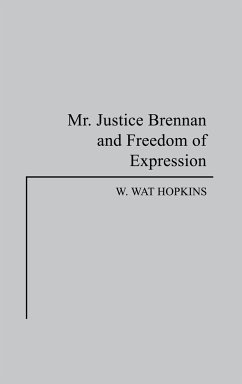On July 21, 1990, Associate Justice William J. Brennan, Jr., announced his resignation from the nation's highest court. The judicial career of the man who Wat Hopkins considers the United States Supreme Court's premier protector of expression came to an end. Hopkins examines the body of Justice Brennan's free expression jurisprudence and shows how Justice Brennan's theory of free expression was built on the metaphor of a marketplace of ideas. Hopkins' analysis is based primarily on an examination of the significant free expression cases during Brennan's thirty-four year term. He concludes that Brennan developed a philosophically sound First Amendment theory that was accepted by the Court, but is not being applied today with the force necessary to make it truly effective. This detailed examination of Justice Brennan's jurisprudence is a noteworthy addition to legal history and scholarship.








